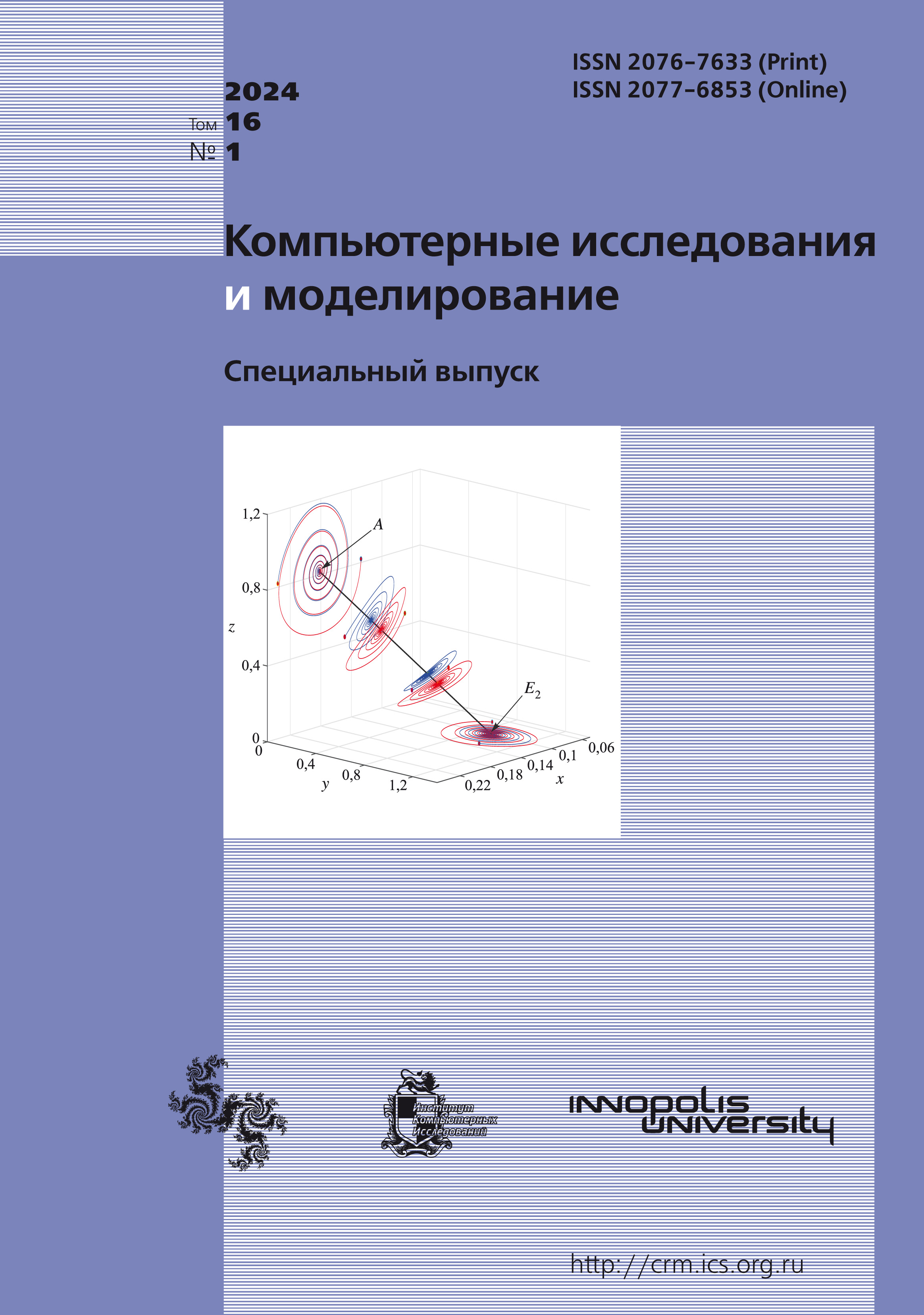All issues
- 2024 Vol. 16
- Issue 1 (special issue)
- 2023 Vol. 15
- 2022 Vol. 14
- 2021 Vol. 13
- 2020 Vol. 12
- 2019 Vol. 11
- 2018 Vol. 10
- 2017 Vol. 9
- 2016 Vol. 8
- 2015 Vol. 7
- 2014 Vol. 6
- 2013 Vol. 5
- 2012 Vol. 4
- 2011 Vol. 3
- 2010 Vol. 2
- 2009 Vol. 1
-
A hybrid regularizers approach based model for restoring image corrupted by Poisson noise
Computer Research and Modeling, 2021, v. 13, no. 5, pp. 965-978Image denoising is one of the fundamental problems in digital image processing. This problem usually refers to the reconstruction of an image from an observed image degraded by noise. There are many factors that cause this degradation such as transceiver equipment, or environmental influences, etc. In order to obtain higher quality images, many methods have been proposed for image denoising problem. Most image denoising method are based on total variation (TV) regularization to develop efficient algorithms for solving the related optimization problem. TV-based models have become a standard technique in image restoration with the ability to preserve image sharpness.
In this paper, we focus on Poisson noise usually appearing in photon-counting devices. We propose an effective regularization model based on combination of first-order and fractional-order total variation for image reconstruction corrupted by Poisson noise. The proposed model allows us to eliminate noise while edge preserving. An efficient alternating minimization algorithm is employed to solve the optimization problem. Finally, provided numerical results show that our proposed model can preserve more details and get higher image visual quality than recent state-of-the-art methods.
-
The application of genetic algorithms for organizational systems’ management in case of emergency
Computer Research and Modeling, 2019, v. 11, no. 3, pp. 533-556Views (last year): 31.Optimal management of fuel supply system boils down to choosing an energy development strategy which provides consumers with the most efficient and reliable fuel and energy supply. As a part of the program on switching the heat supply distributed management system of the Udmurt Republic to renewable energy sources, an “Information-analytical system of regional alternative fuel supply management” was developed. The paper presents the mathematical model of optimal management of fuel supply logistic system consisting of three interconnected levels: raw material accumulation points, fuel preparation points and fuel consumption points, which are heat sources. In order to increase effective the performance of regional fuel supply system a modification of information-analytical system and extension of its set of functions using the methods of quick responding when emergency occurs are required. Emergencies which occur on any one of these levels demand the management of the whole system to reconfigure. The paper demonstrates models and algorithms of optimal management in case of emergency involving break down of such production links of logistic system as raw material accumulation points and fuel preparation points. In mathematical models, the target criterion is minimization of costs associated with the functioning of logistic system in case of emergency. The implementation of the developed algorithms is based on the usage of genetic optimization algorithms, which made it possible to obtain a more accurate solution in less time. The developed models and algorithms are integrated into the information-analytical system that enables to provide effective management of alternative fuel supply of the Udmurt Republic in case of emergency.
-
On accelerated adaptive methods and their modifications for alternating minimization
Computer Research and Modeling, 2022, v. 14, no. 2, pp. 497-515In the first part of the paper we present convergence analysis of AGMsDR method on a new class of functions — in general non-convex with $M$-Lipschitz-continuous gradients that satisfy Polyak – Lojasiewicz condition. Method does not need the value of $\mu^{PL}>0$ in the condition and converges linearly with a scale factor $\left(1 - \frac{\mu^{PL}}{M}\right)$. It was previously proved that method converges as $O\left(\frac1{k^2}\right)$ if a function is convex and has $M$-Lipschitz-continuous gradient and converges linearly with a~scale factor $\left(1 - \sqrt{\frac{\mu^{SC}}{M}}\right)$ if the value of strong convexity parameter $\mu^{SC}>0$ is known. The novelty is that one can save linear convergence if $\frac{\mu^{PL}}{\mu^{SC}}$ is not known, but without square root in the scale factor.
The second part presents modification of AGMsDR method for solving problems that allow alternating minimization (Alternating AGMsDR). The similar results are proved.
As the result, we present adaptive accelerated methods that converge as $O\left(\min\left\lbrace\frac{M}{k^2},\,\left(1-{\frac{\mu^{PL}}{M}}\right)^{(k-1)}\right\rbrace\right)$ on a class of convex functions with $M$-Lipschitz-continuous gradient that satisfy Polyak – Lojasiewicz condition. Algorithms do not need values of $M$ and $\mu^{PL}$. If Polyak – Lojasiewicz condition does not hold, the convergence is $O\left(\frac1{k^2}\right)$, but no tuning needed.
We also consider the adaptive catalyst envelope of non-accelerated gradient methods. The envelope allows acceleration up to $O\left(\frac1{k^2}\right)$. We present numerical comparison of non-accelerated adaptive gradient descent which is accelerated using adaptive catalyst envelope with AGMsDR, Alternating AGMsDR, APDAGD (Adaptive Primal-Dual Accelerated Gradient Descent) and Sinkhorn's algorithm on the problem dual to the optimal transport problem.
Conducted experiments show faster convergence of alternating AGMsDR in comparison with described catalyst approach and AGMsDR, despite the same asymptotic rate $O\left(\frac1{k^2}\right)$. Such behavior can be explained by linear convergence of AGMsDR method and was tested on quadratic functions. Alternating AGMsDR demonstrated better performance in comparison with AGMsDR.
Indexed in Scopus
Full-text version of the journal is also available on the web site of the scientific electronic library eLIBRARY.RU
The journal is included in the Russian Science Citation Index
The journal is included in the RSCI
International Interdisciplinary Conference "Mathematics. Computing. Education"





